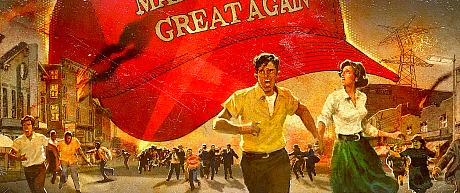The first five paragraphs of “The Perverse Thrill of Chaotic Times“, a 3.25 N.Y. Times piece by Teddy Wayne, offer an uncannily accurate capturing of how Type-A specimens have been feeling deep down since Donald Trump‘s election. I fell into it like a guy on a bungee cord. Yes, exactly…we’re in a monster movie, The Beast From 20,000 Fathoms, and while I’m 70% freaked, I’m also 30% jazzed.
But the thing that really turned my head arrived about 14 paragraphs in. After noting that “political journalism — itself under attack by the president — hasn’t been this ardent since Sept. 11,” Wayne reminds that the World Trade Center attacks “ushered in the era of the superhero, with desire for American might to overcome evil projected onto a single figure.”

Illustration for Teddy Wayne’s “The Perverse Thrill of Chaotic Times” by Anthony Freda and Dan Zollinger.
This reminded me of something I said almost exactly 13 years ago about Tony Scott‘s Man on Fire, in my mind the best rightwing superhero whoop-ass movie ever. Denzel Washington‘s Creasy made the bad guys (i.e., Mexican cartel kidnappers) howl and sweat and scream before killing them like a meter maid hands out a parking ticket, water off a duck’s ass.
In my mind (and in Scott’s, I’m thinking) the cartel guys were stand-ins for the terrorist “other.” Everyone understood that, I think, and millions relished the feeling of payback. No mercy, no quarter. No CG superhero movie has ever made me feel this way. I was in the men’s room adjacent to the Zanuck theatre after my first Man on Fire viewing, and guys at the urinals were going “whoa, fucking Denzel…he doesn’t fuck around…Jesus!”
Man on Fire opened on 4.23.04 — two and a half years after 9.11. I don’t think I’ve ever succumbed quite as fully to a film espousing this kind of rightwing, scorched-earth vengeance. No, I don’t feel good about the likelihood that Steve Bannon and the Breitbart guys probably like Man on Fire as much as I do, but I can’t deny that I feel and endorse what it’s putting out. Yes, still.
Plus I love the spazzy cutting and occasional double exposures and the crazy mid-screen subtitles. And the way Scott allowed the relationship between Washington and young Dakota Fanning to build slowly and gradually, and how he delayed the inciting incident (Fanning’s kidnapping) until the 40-minute mark.
The only bad thing in Man on Fire is the ending. Nobody wanted to see Creasy surrender to the cartel by offering himself as a trade for Fanning.
Here are those riveting five paragraphs from Wayne’s article:
“For all the rational appeal of peace and stability, Americans have a powerful attraction to calamity and disruption. World War II veterans commonly speak of their time in the military, when they felt deeply connected to a meaningful goal, as the best years of their lives. For many baby boomers, the late 1960s, with all its sturm und drang over an unpopular war and antiquated social policies, remains on their personal highlight reels (the free love and drugs may have had something to do with it, too). People who came of age in the pacific ’90s just don’t speak as reverently of seeing Stone Temple Pilots play Lollapalooza as flower children do of watching Hendrix at Woodstock.
“Now, as Donald J. Trump helms arguably the most turbulent presidency since Richard M. Nixon’s, the nation is entering an era of volatility unseen for decades (post-9/11 excepted). And for some people (even the president’s opponents), the climate of crisis inspires a perverse thrill.”
Wells interjection: I was at the Toronto Film Festival when 9.11 happened, and one of my thoughts that day was that I wanted to be down in Manhattan because I regard it as a kind of home (I lived there for nearly six years) and I wanted to experience the horror among friends, and I just wanted to be there — I wanted to smell the aroma of crushed rocks and asbestos clouds and gasoline fumes.
Wayne again: “It has been posited that a number of Trump voters supported him out of an anarchic desire to destroy a system that has not worked for them, or even just to see what would happen with the nuclear codes (or, as an Onion video headline in 2011 astutely put it, ‘Morbid Curiosity Leading Many Voters to Support Palin’). I doubt many liberals have similar inclinations.
“Nevertheless, the atmosphere of Trumpian turmoil makes a lot of people across the political spectrum feel as though they are part of something bigger than themselves.
“’We’ve come to equate drama and crisis with history,’ said Kevin Rozario, an associate professor of American studies at Smith College. ‘We know we’re in the presence of history when things are blowing up. There’s an intensification of emotions when you’re living in historical times, as if it’s more real.'”
